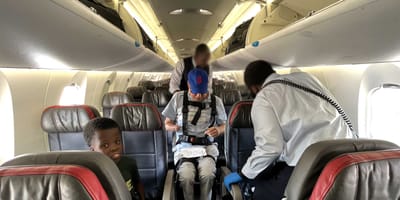Airlines place little emphasis on compliance with the Air Carrier Access Act and, as a result, it is rare for me and other wheelchair users to experience a flight without at least one significant violation.
The reason compliance is so poor is the result of an insufficient enforcement mechanism. As the Supreme Court of the United States ruled in the 2001 case Alexander v. Sandoval, airline passengers who are victims of disability discrimination have no private right of action, and cannot bring cases against carriers for ACAA violations. The Court ruled that a private right of action only exists if Congress grants one and, with respect to the ACAA, enforcement authority rests solely with the Department of Transportation.
As I have documented on this website for years, the DOT rarely takes action against airlines for disability discrimination, and most often does nothing in response to passenger complaints — further disincentivizing compliance. Because of the department’s reluctance to issue monetary fines for ACAA violations, it is cheaper for airlines not to comply, and disabled passengers suffer as a result.
At its annual meeting held on Monday, February 17 in Austin, Texas, the American Bar Association’s House of Delegates took up the issue, and passed a resolution urging Congress to institute a private right of action for disabled airline passengers. A summary of Resolution 106 reads:
[Resolution 106] Urges Congress to amend the Air Carrier Access Act, 49 U.S.C. § 41705 (1986), to establish a private right of action and to provide equitable and legal relief, including compensatory and punitive damages, as well as reasonable attorneys’ fees, reasonable expert fees, and the costs of the action to plaintiffs who prevail in civil discrimination actions.
Advocacy for the addition of a private right of action is something that I have been involved with for many years. Bills doing just that have been proposed before, often under the title of Air Carrier Access Amendments Act.
Many of the proposed ACAA amendments were included in the FAA Reauthorization Act of 2018, but a private right of action was not among them. With airline lobbyists crawling all over Capitol Hill, such proposals have struggled to gain traction and the support of U.S. senators.
The unfounded belief that so-called “drive-by” ADA lawsuits are a major issue affecting businesses makes lawmakers even more suspect of extending a new litigation rights to disabled people.
But just as disabled access to buildings and other public accommodations is a civil right, so too is access to air travel. Disabled people should be able to enforce their equal access rights if the DOT refuses to do so, and the ABA agrees.
By taking this position, the ABA will encourage lawmakers to reconsider the issues impacting disabled travelers. Of course, the ABA resolution cannot stand alone, and I encourage you to voice your concern about the inability to protect yourself from the discriminatory behavior of airlines, by reaching out to your elected representatives. You can find instructions on how to contact government officials, visit www.usa.gov/elected-officials.















